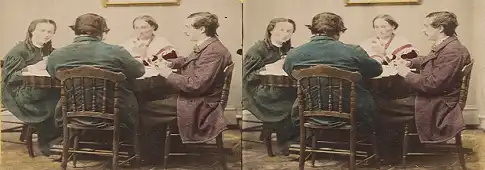
CARD GAMES IN THE WORK OF CHARLES DICKENS
Charles Dickens, the famous 19th-century British author who was known for his vivid depictions of life in Victorian England was not only known for his commentary on social issues and societal structures, he also often used references to card games in his novels and other works.
Dickens was also a passionate player himself, he was particularly fond of playing whist, which was popular in the 19th century. He mentioned whist in several of his novels, including "Great Expectations" and "David Copperfield," and he was known to play the game with friends and family. In fact, he wrote a humorous essay called "Whist Playing" in which he described the strategies and etiquette of the game.
Some sources suggest that he was a skilled player who enjoyed the strategy and social interaction involved in the game. In his essay "Whist Playing," Dickens displays a thorough knowledge of the rules and procedures of whist, and he provides some tips on how to win at the game. He also mentions in several of his novels that he played whist with friends and family, suggesting that he had a genuine interest in the game.
Throughout his career, Dickens used card games to explore themes of deception, social class, and human nature. Below are some of the references to card games in his work.
In Bleak House, Dickens uses the game of whist to depict the social divide between the upper and lower classes. Lady Dedlock, a member of the aristocracy, is shown playing whist with her friends, while the lower-class characters are depicted playing a less sophisticated card game called cribbage. This contrast highlights the class differences in Victorian society and underscores the theme of social injustice that runs throughout the novel.
In Great Expectations, Dickens uses card games to explore the dynamics of power and control. The protagonist, Pip, is often shown playing cards with his social superiors, and the game serves as a metaphor for the power dynamics between them. As Pip becomes more confident and assertive, he becomes a more skilled card player, symbolizing his growing social confidence.
In David Copperfield, Dickens uses card games to explore themes of deception and hidden motives. Several of the novel's characters, including the villainous Uriah Heep, are depicted as skilled card players who use the game to manipulate and deceive their opponents. The game serves as a metaphor for the hidden agendas and secret machinations that drive the novel's plot, highlighting the idea that things are not always what they seem in the world of Victorian England.
In The Pickwick Papers, Dickens uses card games to depict the leisurely pursuits of the upper class. The members of the Pickwick Club are shown playing cards and other games, highlighting their desire for leisure and relaxation. However, the games also become a source of tension and conflict among the members of the club, highlighting the ways in which social interaction can be fraught with hidden agendas and power dynamics.
"Whist Playing" is a humorous essay written by Charles Dickens in which he describes the strategies and etiquette of the card game whist. The essay is written in the form of a dialogue between two characters, Mr. Anthony Chuzzlewit and Mr. Jonas Chuzzlewit, who are discussing the game.
In the essay, Dickens provides a detailed account of the rules and procedures of whist, including the proper shuffling and dealing of the cards, the roles of the players, and the methods of scoring. He also offers some tips on how to win at the game, such as paying close attention to the cards played by other players and maintaining a poker face.
Throughout the essay, Dickens uses a humorous and satirical tone to poke fun at the players and their quirks. He lampoons their obsessive focus on the game and their elaborate rituals, such as the use of special markers and the keeping of score on a tablet.
Overall, "Whist Playing" is a lighthearted and entertaining look at a popular pastime of the Victorian era, and it showcases Dickens' wit and humor.
Throughout his work, Charles Dickens used card games as a versatile symbol that could convey a wide range of meanings and themes. From exploring the dynamics of power and control to depicting the leisurely pursuits of the upper class, card games served as a powerful tool for Dickens to explore the social and cultural issues of his time.